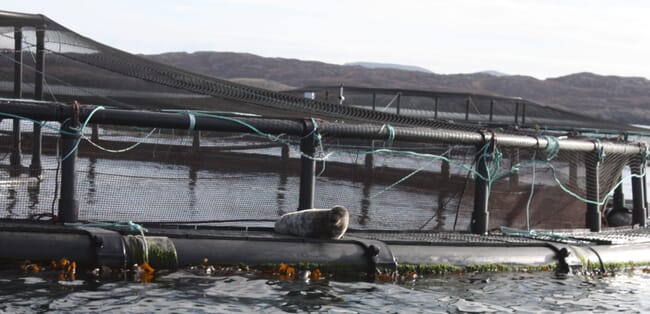Statistics published by Salmon Scotland, the trade body for Scotland's farmed salmon sector, reveal the extent of seal predation on salmon farms, with attacks costing salmon farmers an average of £12 million a year in lost fish.

© Lewis
The figures were contained in a new report setting out in detail that seals are doing to Scotland’s salmon farming sector.
Tavish Scott, chief executive of the SSPO, said seal predation was getting worse and he urged government ministers to sit down with sector leaders to discuss possible solutions.
Mr Scott said: “There is no easy fix but we need a dialogue with ministers – and the leaders of other sectors affected – to find ways of tackling what has become an increasingly serious issue for our members.”
The figures released by Salmon Scotland show that:
- In 2020, 516,443 fish were killed directly in seal attacks (with many hundreds of thousands more so stressed they died later)
- In the eight months to the end of August 2021, a further 347,917 salmon were killed directly by seals, taking the total since January 2020 to 864,360. With four months left in 2021 and with seal attacks peaking traditionally in the winter, the total is due to pass one million well before Christmas.
- The salmon killed by seals would have fetched a market price of £12,253,743 in 2020 and a further £8,436,987 in the eight months of 2021 to end of August, a total lost revenue of £20,690,730.
- Scotland has 210 active salmon farms, of which about 70 percent will be stocked at any one time. This means that the average farm lost 2,792 salmon (with a lost harvest revenue of £67,696) in 2020 and a further 1,955 fish (with an expected harvest revenue of £47,399) in the first eight months of 2021.
Until the start of 2021, salmon farmers could shoot seals as a last resort and a small number, about 50, were shot every year to protect stocks. This power has since been removed by Scottish Government legislation.
Salmon farmers also used to deploy acoustic devices to scare seals away but these have now been removed while salmon farmers discuss licensing issues with Marine Scotland. Salmon farmers have a statutory duty to protect their stock but many feel they are powerless to do anything about seals, which are a protected species, now that they cannot dispatch the predators or scare them away.
All of Scotland’s salmon farmers have invested heavily in new seal-resistant nets but seals find ways of climbing up and over the walk-way barriers and even manage to attack salmon through the nets themselves. The knock-on effects of a seal attack can be even more damaging than the attack itself. The remaining salmon go off their food and their immunity suffers, leaving them open to disease.
Responding to the Salmon Scotland report, Nathan Pyne-Carter, CEO of Ace Aquatec - which produces a range of seal deterrents - said: “Statistics recently published by Salmon Scotland have starkly highlighted the cost salmon farmers are paying in lost fish and revenue due to seal predation. We support the call to action for further government talks as it is critical that farmers are able to protect their livestock and livelihood from this escalating issue.
“Our recent advances in startle response technology help enable farms to take a blended approach to predator control. The most successful safeguards against predation are a multi-facetted approach that incorporates new generation acoustic and electric startle response systems, reinforced anti-predator netting, and good farming practices. This combination can ensure that predators are responsibly encouraged to predate on wild not farmed fish.
“Marine Scotland have created a process which is not transparent and makes no exception for technologies which fall outside the scope of the EPS process.”
Mr Scott said there was now a pressing need for a proper dialogue to find a way forward.
“Scotland’s seal population is growing all the time and many of their traditional sources of food are disappearing, partly because of fishing and partly because climate change is driving species further north.
“They are often hungry and desperate and it is no surprise they do all they can to attack our farms and kill the fish inside the pens.
“But we cannot forget the duty our farmers have to their fish. They have a responsibility to look after them but they cannot do so if they are unable to stop seal attacks.”
Mr Scott made it clear he was not asking for farmers to be allowed to shoot seals again but instead called for a “proper and mature dialogue” with other interested partners – including the caught fisheries sector and wild salmon interests - to find potential solutions to the problem.




